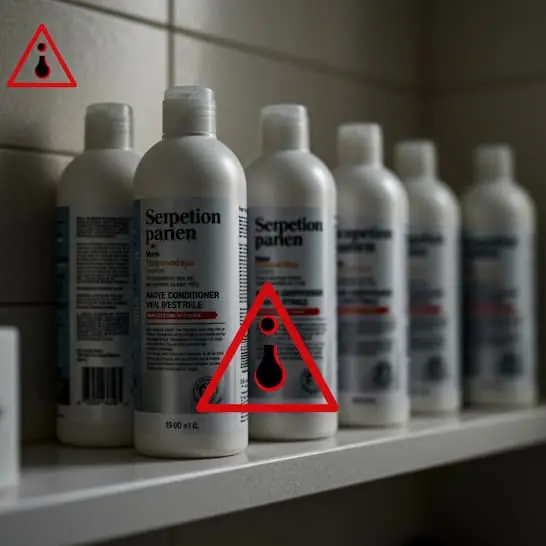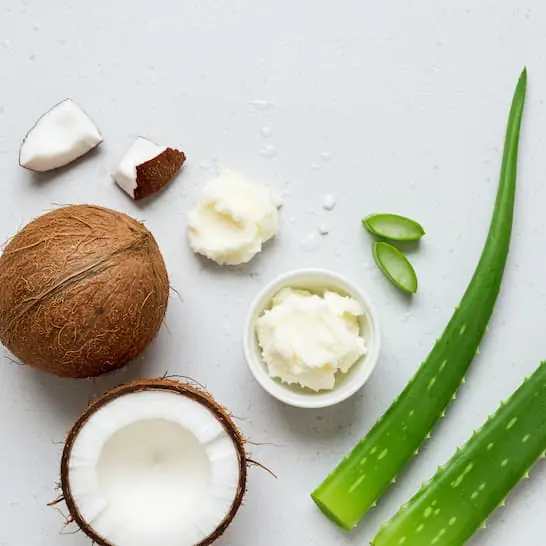Is Your Conditioner Slowly Ruining Your Hair?
The product you use daily for silky smooth hair might be doing more harm than good. Many commercial conditioners contain a cocktail of toxic chemicals that can create a false sense of health while silently suffocating your hair, leading to breakage, dryness, and long-term damage. It's time to stop the damage and question what's in your bottle.

We trust our conditioner to give us soft, manageable hair. But what if that trust is misplaced? What if the very product you rely on for a beautiful finish is actually exposing your hair to harmful ingredients linked to brittleness, hormone disruption, and other serious health concerns?
At Botani Bestie, we believe you have the right to know what you're putting on your hair. We're here to pull back the curtain on the potentially dangerous chemicals hiding in your conditioner and help you make a truly informed choice for your hair's long-term health.
1. Silicones: The False Promise of Shine
Silicones like Dimethicone and Cyclopentasiloxane are powerful, but deceptive, polymers. They coat the hair shaft to give an immediate, cosmetic fix of shine and smoothness. The problem? This plastic-like layer seals out not only frizz but also vital moisture and nutrients. Over time, this suffocating buildup can weigh down your hair, making it appear limp and lifeless, and eventually leading to significant dryness and breakage. For truly healthy hair, you need a conditioner that nourishes, not just masks the damage.
2. Parabens: The Silent Hormone Disruptors
Parabens (e.g., Methylparaben, Propylparaben) are a class of preservatives used to stop bacteria and mold. These chemicals can be absorbed by the body and have been found to mimic estrogen, potentially disrupting your endocrine system. This has raised significant alarms in the health community, with many studies linking them to increased risk of certain cancers. When it comes to your health, it's a risk not worth taking.
3. Fragrance / Parfum: The Unlisted Toxic Cocktail
The term "Fragrance" or "Parfum" is a legal loophole. It allows manufacturers to hide a proprietary blend of hundreds of undisclosed chemicals, including potent endocrine disruptors like **phthalates**, without having to list them individually. This "trade secret" puts consumers at risk of skin irritation, allergic reactions, headaches, and long-term health concerns. Your conditioner should smell great from natural sources, not from a chemical mystery blend.
4. Formaldehyde-Releasing Preservatives
Ingredients like DMDM Hydantoin and Imidazolidinyl Urea are preservatives that slowly release small amounts of formaldehyde over time. Formaldehyde is a known human carcinogen and a common allergen. Its presence in your daily conditioner can cause severe scalp irritation, contact dermatitis, and is a serious health concern that should be avoided at all costs.
5. PEGs: The Hidden Carcinogen Risk
Polyethylene Glycols (PEGs) are petroleum-based compounds that help products feel smooth. The primary and most dangerous concern with PEGs is that they can be contaminated with trace amounts of 1,4-Dioxane, a known human carcinogen, during the manufacturing process. While companies claim to purify these ingredients, the risk is real and completely avoidable by choosing clean beauty products.
6. Synthetic Colors (CI xxxx): Just for Looks, No Benefits
Synthetic colors, often listed as "CI" followed by a number (e.g., CI 15985), are artificial dyes derived from petroleum or coal tar. They serve absolutely no functional purpose for your hair and are added purely for visual appeal. These chemicals can be a source of skin irritation and allergic reactions, and are an unnecessary risk in your hair care routine.
7. Drying Alcohols: The Stripping Agents
Not all alcohols are bad, but the ones to watch out for are "short-chain" or "drying" alcohols like Alcohol Denat and Isopropyl Alcohol. These are used to make products feel lighter, but they strip your hair and scalp of their natural, protective oils. This leads to severe dryness, frizz, and damaged cuticles, especially for those with already dry or curly hair. Don't let these ingredients sabotage your hair's moisture balance.

Rescue Your Hair: Making the Switch to a Safer Formula
Reading ingredient labels is the most powerful weapon you have against toxic hair care. Look for conditioners that proudly state they are **silicone-free**, **paraben-free**, and **sulfate-free**. Seek out formulas that use natural emollients and extracts like shea butter, coconut oil, and botanical extracts to truly nourish and hydrate your hair from within. The switch to clean beauty is a proactive choice for your hair's long-term health and vitality.
Your hair deserves better. It's time to choose a product that nurtures rather than just coats.
"The best ingredients are the ones you can understand."
💚 Related Reads for Your Clean Beauty Journey
Is Your Conditioner Slowly Ruining Your Hair? | Botani Bestie Blog
Is your daily conditioner a silent threat to your hair's health? Discover the shocking truth about toxic ingredients hidden in popular formulas and learn how to switch to safe, natural alternatives for truly healthy, vibrant hair.
Read MoreTwo Golden rule to choose a hair product
Avoiding sulfates, parabens, and silicones is not enough. Learn the two most important things to check before buying hair products: what harmful ingredients to avoid and what nourishing ingredients must be present for healthy hair.
Read MoreMyths vs Facts: The Honest Truth About Natural vs Commercial Beauty
Are commercial products always harmful? Are naturals always safe? We cut through the greenwashing to expose the truth and show how Botani Bestie stands apart.
Read MoreIs Your Shampoo Slowly Damaging Your Hair and Health? | Botani Bestie Blog
Is your shampoo a silent threat? Discover how common ingredients can slowly damage your hair and impact your health, and find out what to use instead.
Read MoreIs Your Hair Oil Slowly Poisoning Your Hair and Scalp? | Botani Bestie Blog
Discover the harmful ingredients in popular hair serums like silicones, alcohol, and synthetic fragrances that can cause long-term damage and dependency.
Read MoreThe Gut-Skin-Mind Axis: Debunking 7 Myths About Beauty from the Inside Out
Stop chasing surface symptoms. Uncover the real scientific connection between your gut health, stress levels (mind), and complexion. Your glow is a reflection of internal balance.
Read More